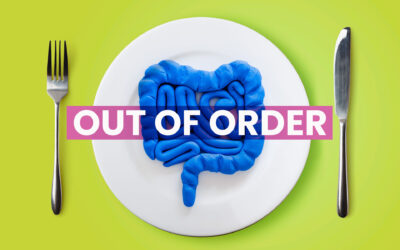‘Gut,’ ‘gut health’ ‘good gut bacteria,’ ‘gut microbiome’ – they are all buzz words now. But most people don’t really know what the gut is or how it functions.
It is easy to be confused with so much information ‘out there’ on the internet. In between the medical terminology and the vastly different ideas on what is healthy, the established basics often get missed.
These fundamentals are needed for you to be in control of your health. Knowing this information will help you to determine if something is just hype or beneficial. So, keep reading, and over the next ten minutes, you will be one of the few who are in the know!
Why is a healthy gut important?
Recent research shows that our gut microbiome and its level of diversity has a far-reaching impact – from fat loss and inflammation levels to mental health and skin problems. It also functions as one of the frontlines of fighting disease.
It is being recognised as a crucial component to our overall wellbeing. It’s not only where many problems begin, but it is also where they may be prevented.
What is the gut, and how does it work?
The ‘gut,’ short for the gastrointestinal tract is a crucial part of our digestive system.
Essentially, it is a long tube that runs the length of the upper body and includes the mouth, oesophagus, stomach, and intestines. The digestive system also consists of the liver, pancreas, and a few other organs that help the process of breakdown and assimilation in the gut!
The gut kicks into action the second you put food into your mouth. This is where the food is broken down into manageable pieces and mixes with saliva and becomes what you could describe as a ‘mush.’ The next part of the journey for your food is down the oesophagus. This is basically a tube between the mouth and stomach. The act of swallowing initiates some powerful muscular contractions so that it can move the bolus of food down to the stomach.
By the time it reaches the stomach, acid and peptic enzymes get to work furiously to dilute the mass and break up the food further. It softens tough connective tissue, hard skins, and husks. It digests proteins and kills off most of the bacteria found in the food – so you don’t get sick. It then delivers the resulting ‘slush’ into the small intestine. This process usually takes a few hours.
Now the work gets interesting. The small intestine is a narrow tube approximately six metres long – I know, you just thought ‘how do you get six metres of tubing in there.’ Over the next 2-4 hours, proteins, fats, and carbohydrates are broken down into amino acids, fatty acids, and sugars. All of these goodies are absorbed into the bloodstream. The leftovers move into the large intestine with lovely wave like motions called peristalsis.
The colon (also known as the large intestine) retrieves unabsorbed material that came from the small intestine. There are trillions of colonic bacteria fermenting the unabsorbed sugars, starches, and proteins into short-chain acids which are utilised as a source of energy. This is also where salt and water are extracted. This process can be as short as five hours and as long seventy.
Finally, the undigested waste moves through the colon to be excreted from the anus and into the toilet bowl. Simple and straightforward – if it is working correctly.
The Role of Bacteria in Gut Health?
What has this got to do with gut bacteria – which everyone is talking about? Well, the gut microbiome (a collective name for all the microbes) is mostly made up of bacteria, but there is an array of viruses, fungi, and other microbes as well. This microbiome essentially lines the entire digestive system. All the way from the top to the bottom. But the majority live in your intestines.
A fun fact – there are more bacterial cells in your body than human cells!
Everyone’s microbiome is unique, and different types of bacteria predominate in certain areas of the body. To make it even more complicated, each type of bacteria plays different roles. But there are a few generalities about what is and isn’t healthy.
In healthy people, there is a varied array of organisms. In people who have gut health problems, there is less diversity and an increase in the bacteria associated with disease.
Some bacteria fight inflammation, while others encourage it. When the gut is healthy, the two types keep each other balanced and in check. But when there is an imbalance, the inflammatory bacteria take over. These produce metabolites that make their way through the lining of the gut, into the bloodstream, dispersing inflammation to other parts of the body.
Through research, scientists are starting to discover that specific types of bacteria in the gut can lead to particular conditions. Some types of bacteria are linked to lowering immune function, others to a higher risk of asthma and allergies. They are discovering that there may be forms that are related to chronic illness such as diabetes and heart disease. Gut health, in general, has also been linked to affecting mood and conditions such as anxiety and depression. Interestingly, the makeup of gut bacteria also varies between lean and overweight people, suggesting that it may play a role in obesity.
What affects gut health?
The gut microbiome affects the body from birth and throughout the lifespan. It controls or influences the digestion of food, the immune system, central nervous system, and other bodily processes.
It is sad to say that our modern lifestyle and diet does not support a healthy gut. It starts with rushing our food, poor nutritional choices and restrictive dieting. Add to that a constant barrage of toxins, alcohol, smoking, medications, antibiotics, poor sleep, and stress. They all have a detrimental effect on our gut health.
Conversely, there are things that you can do daily to improve and support your gut health.
What are the most essential actions to take right now?
- Eating an abundance of plant-based foods.
- Avoid processed and sugary foods. This will allow good bacteria to flourish.
- Make sure you exercise regularly. Good for your gut and your overall well-being.
- Reduce stress levels even if it is starting a 5-minute mindfulness or meditation practice daily. Every little bit helps.
To help promote these small but significant actions, taking Gut Performance™ daily encourages health and optimal gut function. This is done by healing, normalising, and fortifying the protective lining of your digestive tract. It also contains prebiotics to help your naturally occurring microbiome to flourish.
Let us know via our Gut Performance ™ Instagram page if you have tried Gut Performance™ and if it has had an impact on improving your overall gut function!







